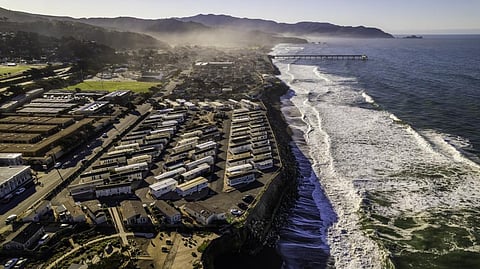

This story has been updated to include a quote by Dhanasree Jayaram
The rise in sea levels and its implications for international peace and security was debated for the first time at the United Nations Security Council February 14, 2023. However, India, along with Russia and Brazil, pointed out the Council was not the place to address climate change.
Sea-level rise (SLR) has doubled since 1993, according to State of the Global Climate in 2022 report by the UN agency World Meteorological Organization. It is a direct negative effect of climate change and creates global problems and, therefore, requires global solutions.
SLR unleashes both sudden and gradual threats to the existence, identity and security of people and nations, said Ian Borg, Minister for Foreign and European Affairs and Trade of Malta and Council President, who chaired the meeting.
Submerged coastlines will threaten critical infrastructure, precipitate resource disputes and further marginalise the most vulnerable, he added.
Over 70 leaders at the meeting argued that climate change should be addressed as part of the Council’s efforts to prevent conflict, sustain peace and build resilience in conflict-affected or otherwise fragile states.
India, Russia and Brazil, however, stated that the Council is not an appropriate forum for such a discussion. These differences in opinion have been earlier flagged by the UN its recent report titled The UN Security Council and Climate Change.
India has a coastline of 7,500 kilometres and several groups of islands located far from the mainland, said Ruchira Kamboj, representing India at the UN Security Council meeting.
She recognised the adverse impact of sea-level rise, but stressed that the Council is not the place to address climate change or that issue. “There exists little scientific correlation or evidence of the impact of climate change on peace and security,” she said.
The United Nations Framework Convention on Climate Change (UNFCCC) process is the most equitable architecture to address the issue, she added.
The Loss and Damage Financial Facility, a key outcome of 27th Conference of Parties (COP27) for UNFCCC, is welcome, Kamboj said and called for its operationalisation.
João Genésio De Almeida Filho, who represented Brazil, stated climate change does not fall within the mandate of the Security Council.
“If the goal of this discussion is to focus on how to prevent political and security concerns related to sea-level rise and build resilience, then the securitisation of this debate may prove itself undesirable and counterproductive,” he said.
The relationship between climate and security has no scientific basis, said Dmitry S Chumakov, Russia.
But despite these differences of opinion and views, the Security Council debate on “sea level rise and security” has successfully flagged and recognised “sea-level rise” as not only an environmental concern but also a major global security threat, which deserves global attention.
Omar Hilale, representing Morocco, urged the UN Security Council to consider climate change impacts on security before conflicts break out or worsen. Weather-related crises have triggered more than twice as much displacement as conflict and violence in the last decade.
By 2050, impacts such as drought or desertification are expected to compel as many as 216 million people to migrate, and so he called upon the nations to lend support to the Global Marrakech Compact for Safe, Orderly, and Regular Migration.
Coastlines of some nations have already seen triple the average rate of SLR, stated António Guterres, the UN Secretary-General António Guterres, who opened the UN meeting.
Sea levels along Indian coast have been rising at a faster rate than the global average. Guterres warned that low-lying communities and entire countries could disappear forever in the coming decades.
“We would witness a mass exodus of entire populations on a biblical scale, and we would see ever-fiercer competition for fresh water, land and other resources,” he said
Delegates representing the coastal states, especially the Small-Island Developing States, also flagged their concerns about the risks posed to their statehood and sovereignty in danger.
India’s statement in the UNSC is guided by political reasons, Dhanasree Jayaram, assistant professor, Department of Geopolitics and International Relations and co-coordinator, Centre for Climate Studies, Manipal Academy of Higher Education, Karnataka, India told Down To Earth.
“The UNSC is an unrepresentative body that may not be the right platform to discuss climate change as it could further polarise the debate by promoting interventionist measures that disregard equity concerns,” Jayaram said.
But this does not mean that there is no evidence of climate impacts on peace and security, he added. “A more nuanced approach towards security implications of climate change in light of growing climate vulnerabilities is required for long-term peace and security,” he said.